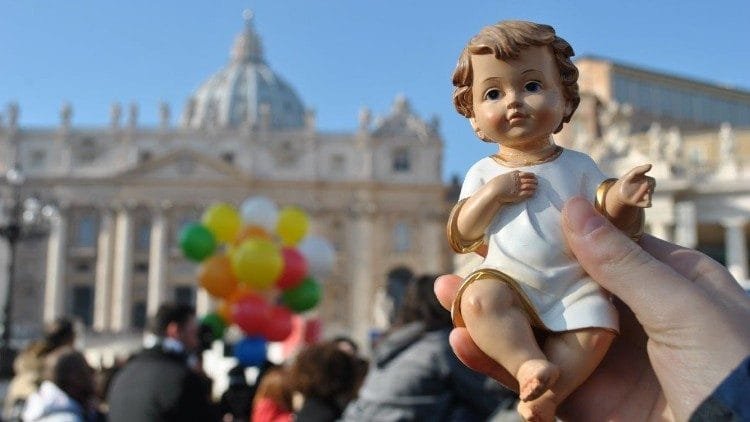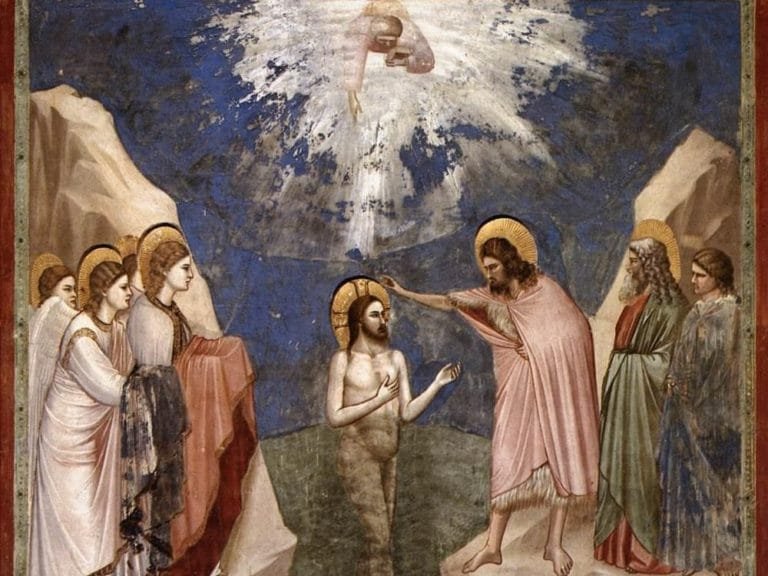POPE FRANCIS’ REFLECTION ON THE 3RD SUNDAY OF ADVENT YEAR B.
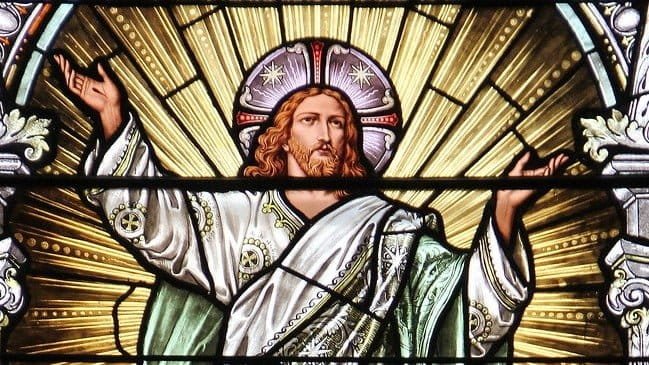
POPE FRANCIS’ 2023 REFLECTION ON THE 3RD SUNDAY OF ADVENT YEAR B.
ANGELUS
Saint Peter’s Square
3rd Sunday of Advent year B, 17 December 2023
________________________________________
Dear brothers and sisters, buongiorno!
Today, the Third Sunday of Advent, the Gospel speaks to us about John the Baptist’s mission (cf. Jn 1:6-8, 19-28), indicating that he is the prophet sent by God to “testify to the light” (v. 8). Let us reflect on this: to testify to the light.
Testimony. The Baptist is certainly an extraordinary man. The people flock to listen to him, attracted by his consistent and sincere way of being (cf. vv. 6-7). His testimony comes through his frank language, his honest behaviour, his austerity of life. All this makes him different from other famous and powerful people of that time, who, instead, invested a lot in appearances. People like him – upright, free and courageous – are luminous, fascinating figures: they motivate us to rise above mediocrity and to be in turn models of good living for others. In every age, the Lord sends men and women like this. Do we know how to recognize them? Do we try to learn from their witness, allowing ourselves to be challenged? Or rather, do we allow ourselves to be bedazzled by fashionable people? Then we get caught in artificial behaviour.
John instead is luminous insofar as he testifies to the light. But what is his light? He himself responds when he states clearly to the crowds who had flocked to hear him that he was not the light, that he was not the Messiah (cf. vv. 19-20). The light is Jesus, the Lamb of God, “God who saves”. Only He redeems, frees, heals and enlightens. This is why John is a “voice” who accompanies his brothers and sisters to the Word; he serves without seeking honours or the spotlight: he is a lamp, while the light is the living Christ (cf. vv. 26-27; Jn 5:35)
Brothers and sisters, the example of John the Baptist teaches us at least two things. First, that we cannot save ourselves alone: only in God do we find the light of life. And second, that each of us, through service, consistency, humility, witness of life – and always by God’s grace – can be a lamp that shines and helps others find the way on which to meet Jesus.
So, let us ask ourselves: In the places I live, how can I testify to the light, testify to Christ in the here and now this Christmas, not in the distant future?
May Mary, mirror of holiness, help us be men and women who reflect Jesus, the light who comes into the world.
Source and copyright: https://www.vatican.va/content/francesco/en/angelus/2023/documents/20231217-angelus.html
ANGELUS ADDRESS
3rd Sunday of Advent year B, 13 December 2020
Dear Brothers and Sisters,
Good morning!
The invitation to joy is characteristic of the season of Advent: the expectation of Jesus’ birth that we experience is joyful, somewhat like when we await the visit of a person we love a great deal, for example, a friend whom we have not seen for a long time, a relative…. We are in joyful anticipation. And this dimension of joy emerges particularly today, the Third Sunday, which opens with Saint Paul’s exhortation: “Rejoice in the Lord always” (Entrance Antiphon; cf. Phil 4:4, 5). “Rejoice!” Christian joy. And what is the reason for this joy? That “the Lord is at hand” (v. 5). The closer the Lord is to us, the more joy we feel; the farther away he is, the more sadness we feel. This is a rule for Christians. Once a philosopher said something more or less like this: “I do not understand how one can believe today, because those who say they believe have a face from a funeral wake. They do not bear witness of the joy of the Resurrection of Jesus Christ”. Many Christians have that face, yes, a face from a funeral wake, a face of sadness…. But Christ is risen! Christ loves you! And you have no joy? Let us think a bit about this and let us ask: “Do I have joy because the Lord is close to me, because the Lord loves me, because the Lord has redeemed me?”.
The Gospel according to John today presents us the biblical character who – excluding Our Lady and Saint Joseph – first and most fully experienced the expectation of the Messiah and the joy of seeing him arrive: naturally, we are speaking of John the Baptist (cf. Jn 1:6-8, 19-28).
The Evangelist introduces him in a solemn way: “There was a man sent from God…. He came for testimony, to bear witness to the light” (vv. 6-7). The Baptist is the first witness of Jesus, with the word and with the gift of his life. All the Gospels agree in showing that he fulfilled his mission by indicating Jesus as the Christ, the One sent by God, promised by the Prophets. John was a leader of his time. His renown had spread throughout Judea and beyond, to Galilee. But he did not surrender even for an instant to the temptation to draw attention to himself: he always oriented himself toward the One who was to come. He used to say: “he who comes after me, the thong of whose sandal I am not worthy to untie” (v. 27). Always indicating the Lord. Like Our Lady: always indicating the Lord: “Do whatever he tells you”. The Lord is always at the centre. The Saints around him, indicating the Lord. And one who does not indicate the Lord is not holy! This is the first condition of Christian joy: to decentralize from oneself and place Jesus at the centre. This is not alienation, because Jesus is effectively the centre; he is the light that gives full meaning to the life of every man and woman who comes into this world. It is the same dynamism of love, which leads me to come out of myself not to lose myself but to find myself again, while I give myself, while I seek the good of others.
John the Baptist undertook a long journey to come to bear witness to Jesus. The journey of joy is not a walk in the park. It takes work to always be joyful. John left everything, in his youth, to put God in first place, to listen to His Word with all his heart and all his strength. John withdrew into the desert, stripping himself of all things superfluous, in order to be freer to follow the wind of the Holy Spirit. Of course, some of his personality traits are unique, unrepeatable; they cannot be recommended for everyone. But his witness is paradigmatic for whoever wishes to seek the meaning of his or her life and find true joy. In particular, the Baptist is a model for those in the Church who are called to proclaim Christ to others: they are able to do so only by detaching from themselves and from worldliness, by not attracting people to themselves but directing them toward Jesus.
This is joy: directing toward Jesus. And joy must be the characteristic of our faith. And in dark moments, that inner joy, of knowing that the Lord is with me, that the Lord is with us, that the Lord is Risen. The Lord! The Lord! The Lord! This is the centre of our life, and this is the centre of our joy. Think well today: how do I behave? Am I a joyful person who knows how to transmit the joy of being Christian, or am I always like those sad people, as I said before, who seem to be at a funeral wake? If I do not have the joy of my faith, I cannot bear witness and others will say: “But if faith is so sad, it is better not to have it”.
By praying the Angelus now, we see all of this fully realized in the Virgin Mary: she silently awaited God’s Word of salvation; she welcomed it; she listened to it; she conceived it. In her, God became close. This is why the Church calls Mary a “Cause of our joy”.
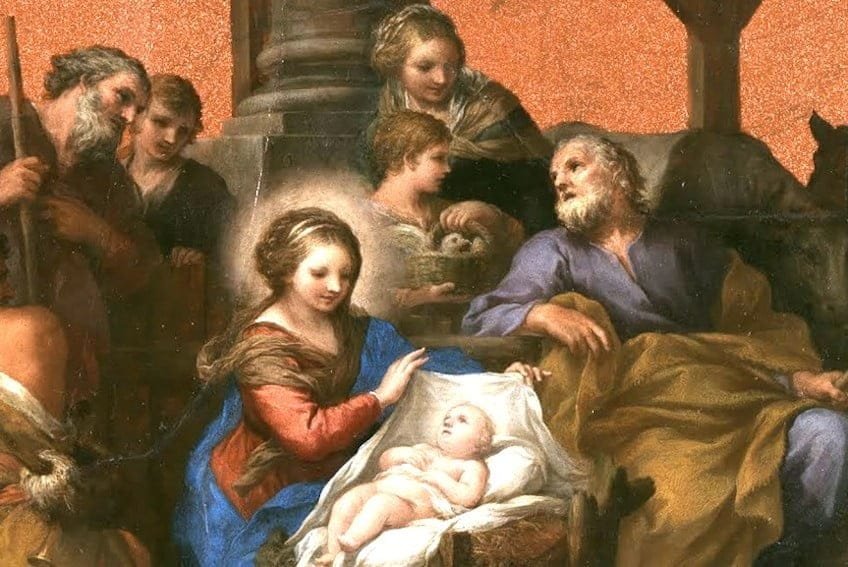
ANGELUS ADDRESS
14 December 2014
Dear Brothers and Sisters, Good morning!
In recent Sundays the liturgy has emphasized what it means to assume an attitude of vigilance and what preparing the way of the Lord entails, concretely. On this Third Sunday of Advent, called the “Sunday of joy”, the liturgy invites us to welcome the spirit with which all this happens, that is, precisely, joy. Saint Paul invites us to prepare for the coming of the Lord, by assuming three attitudes. Listen carefully: three attitudes. First, constant joy; second, steadfast prayer; third, continuous thanksgiving. Constant joy, steadfast prayer and continuous thanksgiving.
The first attitude, constant joy: “Rejoice always” (1 Thess 5:16), Saint Paul says. This means always being joyful, even when things do not go according to our wishes; but there is that profound joy, which is peace: that too is joy; it is within. And peace is a joy “at the ground level”, but it is a joy. Distress, difficulties and suffering pass through each person’s life, we are all familiar with them; and so often the reality that surrounds us seems to be inhospitable and barren, similar to the desert in which the voice of John the Baptist resonated, as today’s Gospel passage recalls (cf. Jn 1:23). But the very words of the Baptist reveal that our joy rests on a certainty, that this desert is inhabited: “among you” — he says — “stands one whom you do not know” (v. 26). It refers to Jesus, the Father’s envoy who comes, as Isaiah stresses, “to bring good tidings to the afflicted; he has sent me to bind up the brokenhearted, proclaim liberty to the captives, and the opening of the prison to those who are bound; to proclaim the year of the Lord’s favor” (61:1-2). These words, which Jesus will speak in his discourse at the synagogue of Nazareth (cf. Lk 4:16-19), clarify that his mission in the world consists in the liberation from sin and from the personal and social slavery that it produces. He has come to the earth to restore to mankind the dignity and freedom of the Children of God — which only he can communicate — and thereby to give joy.
The joy which characterizes the awaiting of the Messiah is based on steadfast prayer: this is the second attitude. Saint Paul says: “pray constantly” (1 Thess 5:17). By praying we can enter a stable relationship with God, who is the source of true joy. A Christian’s joy is not bought; it cannot be bought. It comes from faith and from the encounter with Jesus Christ, the reason for our happiness. And when we are rooted in Christ, the closer we are to Jesus, the more we find inner peace, even among everyday contradictions. For this reason a Christian, having encountered Jesus, cannot be a prophet of misfortune, but a witness and herald of joy. A joy to share with others; an infectious joy that renders the journey of life less toilsome.
The third attitude Paul points to is continuous thanksgiving, which is grateful love towards God. Indeed, he is very generous to us, and we are invited to always recognize his beneficence, his merciful love, his patience and goodness, thus living in unceasing thanksgiving.
Joy, prayer and gratitude are three attitudes that prepare us to experience Christmas in an authentic way. Joy, prayer and gratitude. Everyone together, let us say: joy, prayer and gratitude. [The people repeat.] Once again! [The people repeat.] In this last period of the Season of Advent, let us entrust ourselves to the maternal intercession of the Virgin Mary. She is a “cause of our joy”, not only because she begot Jesus, but because she keeps directing us to him
SOURCE: http://www.vatican.va/content/francesco/en/angelus/2017/documents/papa-francesco_angelus_20171217.html
EMPHASIS MINE
ANGELUS ADDRESS
14 December 2014
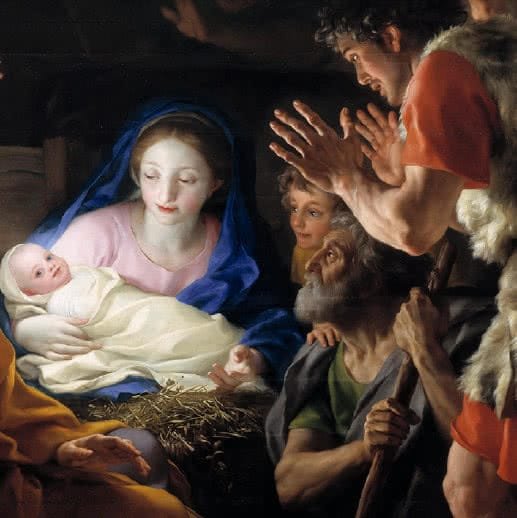
Dear Brothers and Sisters,
Dear Children, Dear Boys and Girls,
Good Morning!
For two weeks already, the Season of Advent has been calling us to spiritual vigilance in preparing the way for the Lord who is to come. On this Third Sunday, the Liturgy sets forth another interior attitude by which to live out this time of waiting for the Lord, that is joy. The joy of Jesus, as that sign [held up in St Peter’s Square] reads: “Joy is at home in Jesus”. That’s it, it proposes Jesus’ joy to us!
The human heart desires joy. We all desire joy, every family, every people aspires to happiness. But what is the joy that the Christian is called to live out and bear witness to? It is the joy that comes from the closeness of God, from his presence in our life. From the moment Jesus entered into history, with his birth in Bethlehem, humanity received the seed of the Kingdom of God, like the soil receives the seed, the promise of a future harvest. There is no need to look further! Jesus has come to bring joy to all people for all time. It is not just a hopeful joy or a joy postponed until paradise: as if here on earth we are sad but in paradise we will be filled with joy. No! It is not that, but a joy already real and tangible now, because Jesus himself is our joy, and with Jesus joy finds its home, as your sign there says: joy is at home in Jesus. All of us, let us say it: “Joy is at home in Jesus”. Once more: “Joy is at home in Jesus”. And without Jesus is there joy? No! Well done! He is living, He is the Risen One, and He works in us and among us especially with the Word and the Sacraments.
We who are baptized, children of the Church, we are called to accept ever anew the presence of God among us and to help others to discover Him, or to rediscover what they have forgotten. It is a most beautiful mission, like that of John the Baptist: to direct the people to Christ — not to ourselves! — for He is the destination to which the human heart tends when it seeks joy and happiness.
In today’s liturgy St Paul again indicates the conditions for being “missionaries of joy”: praying constantly, always giving thanks to God, giving way to his Spirit, seeking the good and avoiding evil (cf. 1 Thess 5:17-22). If this becomes our lifestyle, then the Good News will be able to enter so many homes and help people and families to rediscover that in Jesus lies salvation. In Him it is possible to find interior peace and the strength to face different life situations every day, even the heaviest and most difficult. No one has ever heard of a sad saint with a mournful face. This is unheard of! It would be a contradiction. The Christian’s heart is filled with peace because he knows how to place his joy in the Lord even when going through the difficult moments in life. To have faith does not mean to never have difficult moments but to have the strength to face those moments knowing that we are not alone. And this is the peace that God gives to his children.
With her gaze turned to Christmas already close at hand, the Church invites us to bear witness that Jesus is not a person of the past; He is the Word of God who today continues to illuminate the path of mankind; his gestures — the Sacraments — are the manifestation of the tenderness, consolation and love that the Father bears for every human being. May the Virgin Mary, “Cause of our joy”, render us ever more joyous in the Lord, who comes to free us from the many forms of interior and exterior slavery.
SOURCE: http://www.vatican.va/content/francesco/en/angelus/2014/documents/papa-francesco_angelus_20141214.html
EMPHASIS MINE.
FOR THE
3RD SUNDAY MASS PRAYERS AND READINGS YEAR B, CLICK HERE
3RD SUNDAY OF ADVENT YEAR B REFLECTION HOMILY, GAUDETE OR REJOICE SUNDAY, CLICK HERE, HERE, AND HERE.
SEE AS WELL: “ADVENT 3: GOD WANTS US TO BE HAPPY”
Stay updated: subscribe by email for free TO OUR NEW WEBSITE catholicsstrivingforholiness.org (PUT YOUR EMAIL IN THE SUBSCRIBE WIDGET).
If you need some resources regarding a particular topic, feel free to use the search WIDGET which has access to thousands of posts, categories and tags on Catholic spirituality.
Cordially inviting you as well to follow www.fb.com/Catholicsstrivingforholiness. and share our posts to help more people in their Christian faith and life.
Thanks and God bless you and your loved ones! Fr. Rolly Arjonillo.
